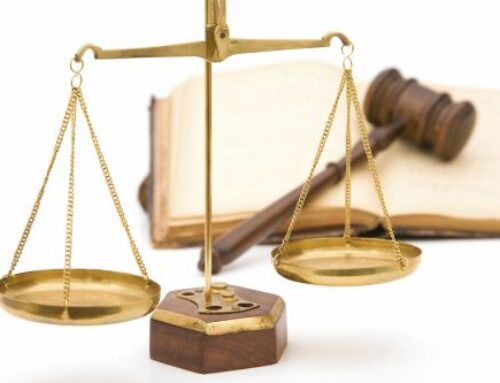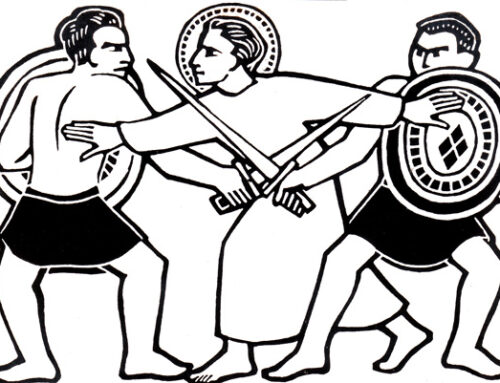Justice in the Old Testament
November 15, 2016
Categories: Justice
This blog post is Part 2 in a 12-part blog series on Christianity and justice. (If you missed the first post, you can find it here.) In the next three posts, we will explore what the Bible has to say about justice. When considering what the Bible has to say about a particular topic, it can be helpful to start from the beginning. In the Bible, you get a sense of God’s heart for justice in the creation narrative.
The call for justice is rooted in the creation story, and particularly in the Imago Dei—the idea that humans were created in the image of God. Here is how the writer of Genesis puts it:
Then God said, “Let us make mankind in our own image, in our likeness, so that they may rule over the fish in the sea and the birds in the sky, over the livestock and all the wild animals, and over all the creatures that move along the ground.”
So God created mankind in his own image, in the image of God he created them; male and female he created them (Genesis 1:26-27).
The call for justice and basic human rights is rooted in the Imago Dei. Humans are created in the image of God, which means they are inherently valuable. Furthermore, God doesn’t differentiate between different types of humans. All humankind is created in the image of God. It doesn’t matter your gender, race, ethnicity, sexual orientation, ability status, religious affiliation, or socioeconomic status. All humans are created in the image of God, and thus should be valued and respected.
It wasn’t long before injustice reared its ugly head. The fourth chapter of Genesis tells the story of two brothers: Cain and Abel. Each brother brought a sacrifice before the Lord. The Lord approved of Abel’s sacrifice but did not approve of Cain’s sacrifice. Following this, Cain burned in anger toward his brother.
Now Cain said to his brother Abel, “Let’s go out to the field.” While they were in the field, Cain attacked his brother Abel and killed him.
Then the Lord said to Cain, “Where is your brother Abel?”
“I don’t know,” he replied. “Am I my brother’s keeper?”
The Lord said, “What have you done? Listen! Your brother’s blood cries out to me from the ground” (Genesis 4:8-10).
In this story, Cain’s act of murder was the ultimate injustice. Cain took his brother Abel, a man made in the image of God, and killed him. Justice needed to be restored. The blood of Abel called out to God to respond in justice.
Justice is also a key theme in the Exodus story. In the book of Exodus, the writer talks about how the Egyptians oppressed the Israelites and forced them into slavery.
So they [the Egyptians] put slave masters over them [the Israelites] to oppress them with forced labor, and they built Pithom and Rameses as store cities for Pharaoh. But the more they were oppressed, the more they multiplied and spread; so the Egyptians came to dread the Israelites and worked them ruthlessly. They made their lives bitter with harsh labor in brick and mortar and with all kinds of work in the fields; in all their harsh labor the Egyptians worked them ruthlessly (Exodus 1:11-14).
It is not long before God sees this injustice and responds, choosing to work through a man named Moses to bring about justice.
The Lord said, “I have indeed seen the misery of my people in Egypt. I have heard them crying out because of their slave drivers, and I am concerned about their suffering. So I have come to rescue them from the hand of the Egyptians and to bring them up out of that land into a good and spacious land, a land flowing with milk and honey—the home of the Canaanites, Hittites, Amorites, Perizzites, Hivites and Jebusites. And now the cry of the Israelites has reached me, and I have seen the way the Egyptians are oppressing them. So now, go. I am sending you to Pharaoh to bring my people the Israelites out of Egypt (Exodus 1:7-10).
In the Old Testament, justice is described as a core attribute of God. The Israelites are called to remember their time of slavery in Egypt, and to do justice in their own lives and communities.
For the Lord your God is God of gods and Lord of lords, the great God, mighty and awesome, who shows no partiality and accepts no bribes. He defends the cause of the fatherless and the widow, and loves the foreigner residing among you, giving them food and clothing. And you are to love those who are foreigners, for you yourselves were foreigners in Egypt (Deuteronomy 10:17-19).
Justice was also a core component of the laws of the people of Israel.
Do not take advantage of a hired worker who is poor and needy, whether that worker is a fellow Israelite or a foreigner residing in one of your towns. Pay them their wages each day before sunset, because they are poor and are counting on it. Otherwise they may cry to the Lord against you, and you will be guilty of sin (Deuteronomy 24:14-15).
Do not deprive the foreigner or the fatherless of justice, or take the cloak of a widow as a pledge. Remember that you were slaves in Egypt and the Lord your God redeemed you from there. That is why I command you to do this.
When you are harvesting in your field and you overlook a sheaf, do not go back and get it. Leave it for the foreigner, the fatherless and the widow, so that the Lord your God may bless you in all the work of your hands. When you beat the olives from your trees, do not go over the branches a second time. Leave what remains for the foreigner, the fatherless and the widow. When you harvest the grapes in your vineyard, do not go over the vines again. Leave what remains for the foreigner, the fatherless and the widow. Remember that you were slaves in Egypt. That is why I command you to do this (Deuteronomy 24:17-22).
Finally, justice is a major theme in the writings of the Prophets. The Prophets were messengers from God who were sent to the people of Israel to rebuke them and try to get the Israelites back on track. Justice was a major focus of their message. For example, the prophet Isaiah shares a message about the meaning of ‘true fasting.’
Shout it aloud, do not hold back. Raise your voice like a trumpet. Declare to my people their rebellion and to the descendants of Jacob their sins. For day after day they seek me out; they seem eager to know my ways, as if they were a nation that does what is right and has not forsaken the commands of God. They ask me for just decisions and seem eager for God to come near them. “Why have we fasted,” they say, “and you have not seen it? Why have we humbled ourselves, and you have not noticed?”
Yet on the day of your fasting, you do as you please and exploit all your workers. Your fasting ends in quarreling and strife, and in striking each other with wicked fists. You cannot fast as you do today and expect your voice to be heard on high. Is this the kind of fast I have chosen, only a day for people to humble themselves? Is it only for bowing one’s head like a reed and for lying in sackcloth and ashes? Is that what you call a fast, a day acceptable to the Lord?
Is not this the kind of fasting I have chosen: to loose the chains of injustice and untie the cords of the yoke, to set the oppressed free and break every yoke? Is it not to share your food with the hungry and to provide the poor wanderer with shelter—when you see the naked, to clothe them, and not to turn away from your own flesh and blood? Then your light will break forth like the dawn, and your healing will quickly appear; then your righteousness will go before you, and the glory of the Lord will be your rear guard. Then you will call, and the Lord will answer; you will cry for help, and he will say: Here I am (Isaiah 58:1-9).
Perhaps the call for justice is best summarized by the prophet Micah, who summarized the requirements of God into three points.
He has shown you, O mortal, what is good. And what does the Lord require of you? To act justly and to love mercy and to walk humbly with your God (Micah 6:8).
Justice is a prominent theme throughout the Old Testament. It is rooted in the Imago Dei, displayed through the Exodus narrative, and integrated into the heart of God and the laws of the Israelites. The Prophets, sent to redirect the Israelite nation when they had gone off track, hammered the message of justice over and over again. Justice is integral to what God is all about.
Discussion: What do you think about how justice is presented in the Old Testament?
Related Thoughts
9 Comments
Leave A Comment

Subscribe To My Newsletter
Join my mailing list to receive the latest blog posts.
Receive my e-book “The Mental Health Toolkit” for free when you subscribe.






[…] are fair. Justice was a big deal to God. We see this in his relationship with the Israelites in the Old Testament, in the life and teaching of Jesus, and in the teachings of the early church in the New Testament. […]
[…] Click here to read Part 2: Justice in the Old Testament […]
[…] justice. (If you missed the first post, you can find it here.) Now that we have talked about the biblical foundation for justice, as well as some barriers that hold Christians back from fully engaging in justice efforts, I’d […]
I have not found all of your references to be accurate. I go to look up the passage and I do not find what you are quoting to match with the reference that you give.
Michael, which references did you find inaccurate?
[…] not “spiritual orphans”; actual socially and economically downtrodden orphans). The Old Testament is rife with social justice, and any claims otherwise are misguided at best. Micah 6:8 calls us […]
[…] for equality, the oppressed, and justice. In the Bible, this is a consistent theme—beginning with God’s covenant relationship with Israel and also expressed in the life and teachings of […]
Thank you for your work.
[…] was important to the heart of God, and we see a focus on justice throughout the Old Testament, the life and teachings of Jesus, and in the early church. Justice involves giving people equal […]